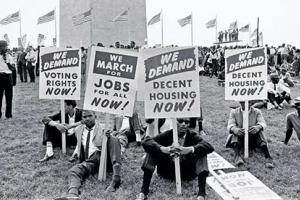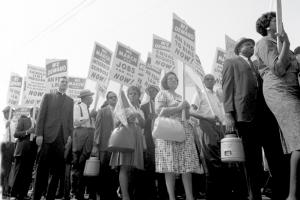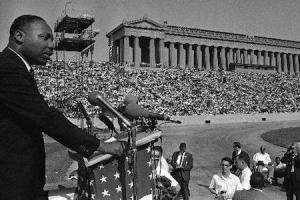Celebrating MLK Day: Dream Defenders, Moral Mondays, and the Fight for 15
Labor and Working-Class History Association
 Everyone who marched has their own special memory. Although the event comes down to us mainly as the Rev Martin Luther King's "I have a dream" speech to the huge throng standing in the sweltering heat or sprawled cooling their toes in the Mall's reflecting pool, I remember it as one big picnic with everyone in their Sunday best and on their best manners firmly clasping hands in King's "beloved community". But it wasn't all kumbaya.
Everyone who marched has their own special memory. Although the event comes down to us mainly as the Rev Martin Luther King's "I have a dream" speech to the huge throng standing in the sweltering heat or sprawled cooling their toes in the Mall's reflecting pool, I remember it as one big picnic with everyone in their Sunday best and on their best manners firmly clasping hands in King's "beloved community". But it wasn't all kumbaya.
 The Supreme Court’s decision gutting the Voting Rights Act in late June and the acquittal of George Zimmerman less than three weeks later make this year’s march “exponentially more urgent” with respect to pressuring Congress and arousing the conscience of the nation, says Ben Jealous, president of the NAACP, a co-sponsor of the march.
The Supreme Court’s decision gutting the Voting Rights Act in late June and the acquittal of George Zimmerman less than three weeks later make this year’s march “exponentially more urgent” with respect to pressuring Congress and arousing the conscience of the nation, says Ben Jealous, president of the NAACP, a co-sponsor of the march.
 The calls for stricter gun control laws are not enough. Although the gun murder rate in some large cities is down, the causes of urban gun violence remain the real problem. At the June 1966 gang summit, Dr. King asked Chicago’s gangs to channel their energies into nonviolent protest of poverty and inequality. He tried to imprint upon the young men gathered at the Sheraton that violence was futile, and would likely get them nowhere but a grave or a prison cell.
The calls for stricter gun control laws are not enough. Although the gun murder rate in some large cities is down, the causes of urban gun violence remain the real problem. At the June 1966 gang summit, Dr. King asked Chicago’s gangs to channel their energies into nonviolent protest of poverty and inequality. He tried to imprint upon the young men gathered at the Sheraton that violence was futile, and would likely get them nowhere but a grave or a prison cell.
Spread the word